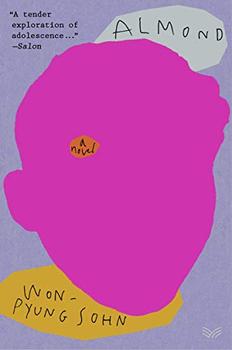Summary | Excerpt | Reviews | Beyond the Book | Read-Alikes | Genres & Themes | Author Bio

Critics' Opinion:
Readers' Opinion:
First Published:
May 2020, 272 pages
Paperback:
Jun 2021, 256 pages
 Book Reviewed by:
Book Reviewed by:
Kelly Hydrick
Buy This Book
This article relates to Almond
 The term neurodiversity refers to the diversity of human brains and minds — the infinite variation in neurocognitive functioning within our species. Neurodiversity encompasses both neurotypical individuals whose neurocognitive functioning is considered by societal standards to be "normal," as well as neurodivergent individuals who experience cognitive, affectual and/or sensory processes that diverge from the typical. Although the term neurodiversity was originally coined by scientist Judy Singer, who is autistic, in the late 1990s and specifically used to describe autistic neurotypes, today it also includes ADHD, bipolar conditions, dyslexia, dyspraxia, OCD, schizophrenia, Tourette syndrome and other neurodevelopmental disabilities.
The term neurodiversity refers to the diversity of human brains and minds — the infinite variation in neurocognitive functioning within our species. Neurodiversity encompasses both neurotypical individuals whose neurocognitive functioning is considered by societal standards to be "normal," as well as neurodivergent individuals who experience cognitive, affectual and/or sensory processes that diverge from the typical. Although the term neurodiversity was originally coined by scientist Judy Singer, who is autistic, in the late 1990s and specifically used to describe autistic neurotypes, today it also includes ADHD, bipolar conditions, dyslexia, dyspraxia, OCD, schizophrenia, Tourette syndrome and other neurodevelopmental disabilities.
The neurodiversity paradigm challenges the prevalent "medical model" of disability and instead adheres to the "social model." Rather than working on changing a neurodivergent person to help them fit into society, by teaching them to pass as neurotypical, for example, the social model focuses on changing the barriers within society which make it difficult for this person to realize equality and independence.
As a political movement, neurodiversity also encompasses the idea of neurodivergence as a social category, similar to ethnicity, socioeconomic class, sexual orientation, gender or physical ability/disability. The neurodiversity movement intersects with a larger network of important social justice movements and concepts, such as Black Lives Matter and LGBTQIA+ pride, and has gained increasing political significance as community members have advocated for rights. As with other social justice movements, it is the lived experiences of the marginalized group — in this case neurodivergent people — that serve as the best guide on how to mitigate social barriers, including individual and institutional discrimination, exclusionary education and accessibility issues in public spaces.
Along with those of other marginalized identities, it is important for neurodivergent characters to appear in the books we read. Sohn Won-pyung's Almond is the second novel featuring a neurodivergent protagonist that I've read in as many months. For the most part, Sohn represents neurodivergence in a positive way; however, positive and adequate representation for neurodivergent people is still unfortunately not the norm. Stereotypical ideas of neurodivergence abound in fiction, often because neurodivergent people aren't included in the creation process. Besides being overly simplifying, stereotypical depictions have the potential to normalize incorrect or problematic views of people, which affects how they are treated in real life. Many of these depictions arise from problems that exist with how disability is viewed in general. For example, ableist language (language that discriminates against people with disabilities, often in an abusive or derogatory way), "inspiration porn" story lines where disabled people are considered inspirational simply for existing, and romanticization or stigmatization of disability all contribute to the flattening of neurodivergent characters (among many others), reducing them to emblems rather than nuanced, realistic and valuable individuals in their own right.
Representation of marginalized characters in a broader sense is important both in terms of self-recognition and respect for readers who share the marginalizations depicted and awareness for readers who don't. Speaking of the need for diversity in books, author Matt de la Peña has said, "[W]e'd love to find ourselves in books and read about ourselves and our own experiences. But it's also important to read about people who aren't like us. It's only then that we'll have a full understanding of the world around us." However slowly it may be happening, it's heartening to see an increasing presence of diversity in English-language fiction (including translations such as Almond) today, because whether it's racial diversity, LGBTQIA+ diversity or neurodiversity, representation matters in the books we read.
A rainbow infinity design, which has been used to represent and celebrate both the diversity of the autism spectrum and neurodiversity in general
Filed under Society and Politics
![]() This "beyond the book article" relates to Almond. It originally ran in July 2020 and has been updated for the
June 2021 paperback edition.
Go to magazine.
This "beyond the book article" relates to Almond. It originally ran in July 2020 and has been updated for the
June 2021 paperback edition.
Go to magazine.





The House on Biscayne Bay
by Chanel Cleeton
As death stalks a gothic mansion in Miami, the lives of two women intertwine as the past and present collide.

The Flower Sisters
by Michelle Collins Anderson
From the new Fannie Flagg of the Ozarks, a richly-woven story of family, forgiveness, and reinvention.

The Funeral Cryer by Wenyan Lu
Debut novelist Wenyan Lu brings us this witty yet profound story about one woman's midlife reawakening in contemporary rural China.
Your guide toexceptional books
BookBrowse seeks out and recommends the best in contemporary fiction and nonfiction—books that not only engage and entertain but also deepen our understanding of ourselves and the world around us.